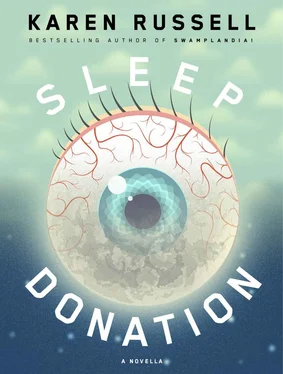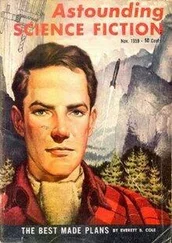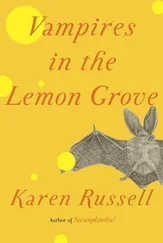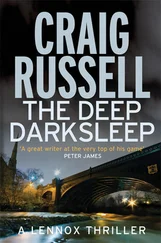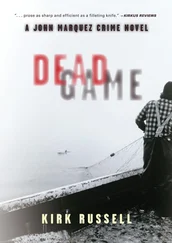Until who came?
“Abigail!” I blurt out.
Mr. Harkonnen lifts an eyebrow.
“Baby A,” I correct, looking down.
“You got privileges, huh? Teacher’s pet? What else do you know about us?”
“I’d never betray her real name to anybody, sir.”
“So we’re back to ‘sir’ now.”
He takes a long drink.
“Go ahead. Call her Abby. Make her a baby.”
His grin hardens until his face looks wind-chapped.
“Baby A —that always sounded to me like some damn sports drink. .”
I’m scared, and I think he is, too. Light from the moonlamps is reflected in Mr. Harkonnen’s eyes, tiny weather vanes spinning in each black pupil, and returning his stare I am dizzily aware that our night could go in any number of directions.
“What did your boss tell me? The tall one —who’s that again?”
“Jim. Or Rudy. They’re twins. ‘Tall’ doesn’t narrow it down.”
“He said you got the highest number of recruits.”
I feel myself darken. “Thanks to my sister. Her story.”
“So that’s the game, huh? You franchise your sister.”
“I don’t want to talk about her here.”
But his eyes gleam, he is taken by this idea.
“Sure. I get it now. You franchise her pain. Dori Edgewater. Well, it worked, didn’t it?” He grins at me with slack, fish-pale lips. “She’s famous. Everybody knows her, your sister. Just like everybody knows my daughter.”
Two hunchbacked men are fighting in the corner with their barstools lifted over their heads, the chair legs facing outward like spiny antlers, so that they look like enormous beetles charging one another; Night World bouncers in their ominous uniforms arrive to break it up. Jacked electives, reports the bartender-pharmacist. This altercation happens in the shallows, near the flaps. At our depth of the speakeasy, nobody so much as blinks.
I wait for Mr. Harkonnen to accuse me now:
You do what he did , he’ll add, to them. You are just like Donor Y.
Or what else might he say, regarding Dori?
She’s dead. She’s dead. What’s it going to take? Do you want me to ice a cake with that? Your sister’s dead. Everything you’ve done, you’ve done for yourself alone.
But Mr. Harkonnen’s focus seems to have rolled inward, onto his own failures:
“Justine is too damn good for her own good. She has no defenses. And Abby? Poor kid, I’m sure she’ll take after her mother. Assuming she makes it out of preschool. You think I can protect either of them, from what they turned out to be? My wife is a far better person than I am. That’s why I married her.”
I open my mouth intending to agree with him —to compliment the virtue of Mrs. Harkonnen.
Then I think I have my own hiccup of insight into Mr. Harkonnen’s dilemma. He got more goodness than he bargained for, maybe, when he married her. Some flood he cannot dam or drain or control. Unfortunately for Felix Harkonnen, the same currents of goodness that originally drew him to his wife, we at the Corps have also discovered.
“I’d better shut up,” he says after a while. “Drank too much.”
But a minute later, he grabs my arm.
“Tell me this,” says Felix, whose first name I’ve yet to say aloud.
“If your sister —Dori —were alive today, and she were the universal donor? What would you do, huh? How much would you let them take from her?”
“If it were me, sir, I promise you, I’d let them —”
“But say it’s not you, in this scenario. Say it’s Dori.”
I don’t answer.
To our left, there is a burst of muted applause; people are whispering that an orexin-woman is genuinely asleep. Two men have lifted her up, and with infinite care they are transporting her through the smoky speakeasy. It’s quite something: the crowd falls into a silence that pulses with energetic longing, and people move around her dangling feet with the reverence due a new saint. Watching even one woman nod off into sleep has changed the tent’s entire atmosphere. Now the air feels almost musky with group credulity, the group’s decision to blink an apparition into reality. Her feet wave at us as she is carried from the tent, her entire body limp. If you were a cynic, you might assume this woman was a plant; her stunt-recovery, if that’s what we’re watching, seems to be very good for business. Medicines miracle around the bar, everyone buying everyone rounds. Nobody talks. Crickets are singing beyond the tent flaps, you can hear them in the silence. At one of the kiosks, they were selling a specially bred cricket with emerald wings as an “organic lullaby-machine.” The woman next to me has one in a ruby-tinted jar on the bar, its red legs fiddling away.
Half my drink is gone, I note. Mr. Harkonnen keeps slipping in and out of focus on the barstool. My muscles, they’re melting. Tiny knots untwist themselves throughout my body. What I somehow continue not to say:
[Jim Storch sold your daughter’s sleep.]
What would Felix Harkonnen do if he knew this?
Just imagining the conversation makes my gut cramp. How will I pitch it? I’ll tell him I had no idea my boss had brokered this sale with the Japanese researchers. I’ll emphasize my ignorance; I’ll tell him, too, that Jim Storch seems to genuinely believe that the illegal transfer of Abigail’s sleep was both justified and necessary. I find that I badly want to defend Jim to Mr. Harkonnen, to explain that my boss believed he was acting in everyone’s best interests, regardless of whether or not this is true. I want to restate Jim’s grandiose, beautiful claims for Mr. Harkonnen. He called his deal the only way forward.
What if Jim’s right?
I squeeze shut. Eyes closed, I try to imagine it: Jim’s decision in transit. The Baby A sleep units travelling over the Pacific into the right hands, the capable hands of these Tokyo researchers.
If his scheme fails, the Harkonnens need never know. If his scheme works, and they do achieve synthesis, and manufacture artificial sleep, a faucet of unconsciousness, an inexhaustible dream well, “sleep for all,” the realized goal, my God, then we’ve got an outcome straight out of a comic book, or the New Testament: the Harkonnens sacrifice their infant’s sleep, Jim Storch takes a bold risk, I keep shut, the Japanese team gets her sleep on tap, all the terminal insomniacs are saved, et cetera, et cetera, in a daisy chain of gorgeous goodness, fortune. And why not? Why couldn’t it happen, just like that? Religions spore out of such stories. Movies starring Denzel Washington are made of far less.
“Slow down. You’ve got the hiccups.”
Mr. Harkonnen swings an arm around, thumps my back. With his brown hair slicked back like that, with his house-musk of baby powder and Old Spice, and his spatulate hands with their dirty thumbnails, he’s got a mammalian sweetness to him in the speakeasy’s neon den. His automatic tenderness must come from taking care of Abby. Whenever Mr. Harkonnen burps the baby, he looks like a gentle, enormous beaver. His gesture is well-timed with my secret thoughts to make me want to tell him everything; and then, not a second later, to make me scared of losing everyone. Not just Rudy and Jim and my life in the Corps trailer, but the Harkonnens.
I stare at Mr. Harkonnen. A chalky taste rises that I want only to swallow. Easiest to believe Jim’s calculations, Jim’s predictions. Why not? He is an empirical savant, Jim. He made his fortune as a businessman.
But it’s useless to pretend that I can still trust Jim. Any minute now, I’m going to tell Mr. Harkonnen. As scared as I am, I don’t see how it can be avoided. Dori’s working in me, on me, dissolving the capsule around the secret. I must tell you something very upsetting, Mr. Harkonnen. .
Читать дальше
